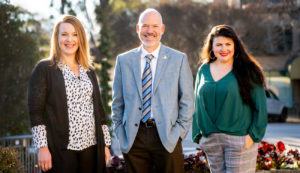When the novel coronavirus pandemic struck in 2020, it delivered an array of unforeseen hardships including shutdowns, unemployment and overburdened hospitals in communities across the world.
Athens-Clarke County, however, had a head start in reacting to its community’s needs, thanks to an ongoing research project from the University of Georgia’s College of Public Health. The Athens Wellbeing Project (AWP), which surveyed local residents in 2016 and 2018, provided detailed data and analysis at the neighborhood level that allowed community leaders and institutions to deal with variables ranging from food insecurity to vaccination outreach to WiFi distribution for its citizens in need.
“The data wouldn’t have been available before AWP, and the capacity to analyze that data and get it to those partners quickly was also made possible because of the researchers on our team,” said Grace Bagwell Adams, an associate professor in the College of Public Health who started the Athens Wellbeing Project in 2015 as its lead investigator. “The pandemic has made it especially clear for our community stakeholders how useful the data can be. We have applied it multiple times in the context of food security and emergency food distribution and other areas.”
Kelly Girtz, mayor of Athens-Clarke County, concurs.
“We already knew where those challenge areas were, so we didn’t have to reinvent the wheel in the midst of a crisis,” Girtz said of the household data provided in two previous AWP surveys. “We already knew where deficits were.”
The next phase of wellbeing
Now the Athens Wellbeing Project has launched a third survey, utilizing postcard mailings, email outreach and special data-collection teams that partner with nonprofit shareholders for vulnerable populations.
The stated mission of Phase 3 remains exactly the same: “to empower the Athens community with meaningful data that will lead to more informed decision-making, improvements in service delivery, and greater quality of life for our citizens.” Bagwell Adams, now an assistant dean for outreach, engagement and equity at CPH, said AWP collects data across five domains: health, housing, community safety, civic vitality and education.
“We are trying our best to get meaningful data into the hands of our community stakeholders—the school district, the local government, the police department, and our hospital systems, as well as local non-profits,” said Bagwell Adams. “Most communities look at each of these data points in isolation rather than breaking the silos down among these domains. That’s a mistake, because if we want to understand any areas of these human services deliveries, we have to look at all of them.”
The AWP survey provides a holistic snapshot of the community’s needs and assets over time at a neighborhood level so it can better inform policies and help deliver the services needed for area households to shift, as Bagwell Adams puts it, “from surviving to thriving.”
→ Read the entire article at UGA Research.

The Athens Wellbeing Project was started in 2015 by lead investigator Grace Bagwell Adams (right), an associate professor in UGA’s College of Public Health. While Bagwell Adams and her team collect and analyze data, the Athens Area Community Foundation—led by president and CEO Sarah McKinney (left)—holds funds, pays expenses and convenes stakeholders. Athens-Clarke County Mayor Kelly Girtz (center) has applied the resulting data multiple times in areas including food security and emergency food distribution. (Photo by Jason Thrasher)
Posted April 6, 2022. Originally published January 25, 2022.
April 4-10 is National Public Health Week! Follow our social media channels – Facebook | Twitter | Instagram| LinkedIn – as we highlight current challenges around each issue, and share how CPH is helping to make our communities healthier, stronger and safer!






